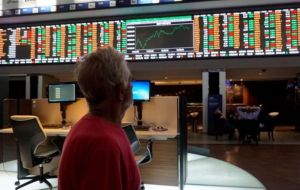MercoPress. South Atlantic News Agency
US/China trade war and the Argentine situation impacts on Brazil's central bank policy of lower interest rates
 Brazilian markets were rocked in the aftermath of Argentine President Mauricio Macri’s landslide loss in Sunday’s primary vote which prompted fears of a spillover
Brazilian markets were rocked in the aftermath of Argentine President Mauricio Macri’s landslide loss in Sunday’s primary vote which prompted fears of a spillover Brazil’s central bank will have to weigh potential price pressures from the U.S.-China trade war against prospects of a disappointing recovery when determining how long its easing cycle will last.
On one hand, worsening trade tensions - coupled with Argentina’s shock primary election result - may push Brazil’s real lower and consequently dissuade policy makers from more aggressive benchmark interest rate cuts. On the other, fresh signs of weak domestic activity may pave the way for an even steeper decline in the Selic.
Brazil surprised financial markets with a larger-than-expected rate reduction at its last policy meeting, joining peers from Chile to India that are also injecting stimulus. Prospects for borrowing cost cuts in Brazil were boosted by the advance of a crucial pension reform. For Bank of America Merrill Lynch chief economist David Beker, an additional 125 basis points in cuts are in store this year for Latin America’s largest economy provided its currency doesn’t steady at a weaker level.
“The risk to this outlook is a continued currency depreciation,” Beker said. “The question is how far the exchange rate goes beyond 4 reais per dollar.”
Recent financial market turbulence laid bare how sensitive rate cut forecasts are to swings in the currency. A 2.25% plunge in the real against the dollar last Monday prompted traders to scale back bets of a second straight half-point cut at the central bank’s next rate-setting meeting in September.
That drop in the real coincided with a plunge in the Chinese currency to the lowest level in over a decade, a move that provoked the ire of U.S. President Donald Trump. Relative calm just three days later led traders to reverse course and boost wagers.
Still, local markets were rocked again in the aftermath of Argentine President Mauricio Macri’s landslide loss in Sunday’s primary vote which prompted fears of a spillover effect.
In speeches since the July 31 rate decision, Brazil central bank President Roberto Campos Neto said the country is prepared to withstand global volatility. He cited factors including a stock of international currency reserves and a low current account deficit.




Top Comments
Disclaimer & comment rules-

Read all comments- Weren't they planning to lower the rates anyway?
Aug 14th, 2019 - 12:23 am 0- Even at the lower rates are there ANY borrowers?
Commenting for this story is now closed.
If you have a Facebook account, become a fan and comment on our Facebook Page!